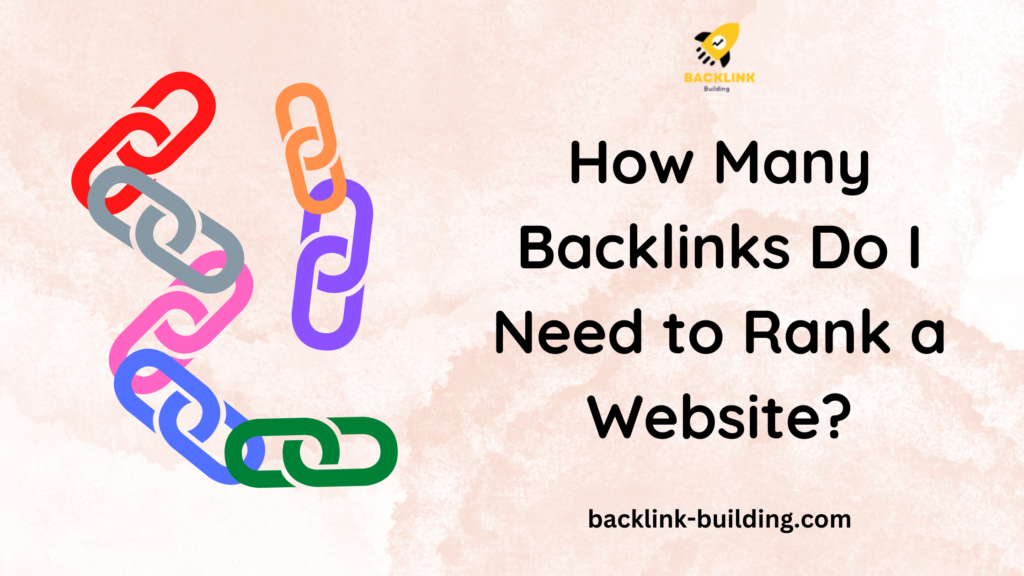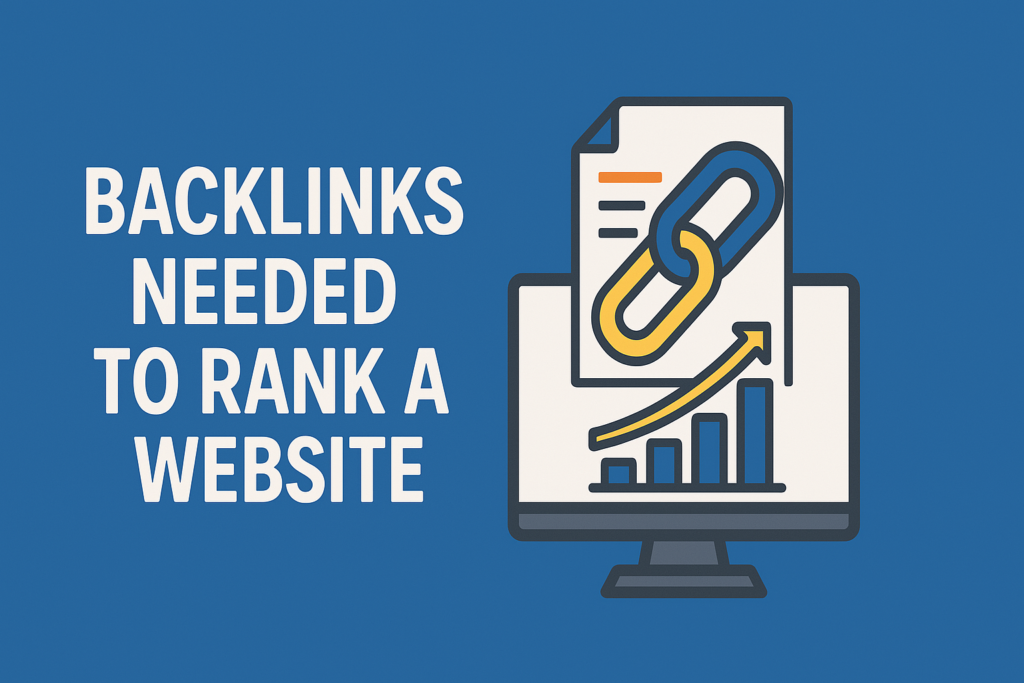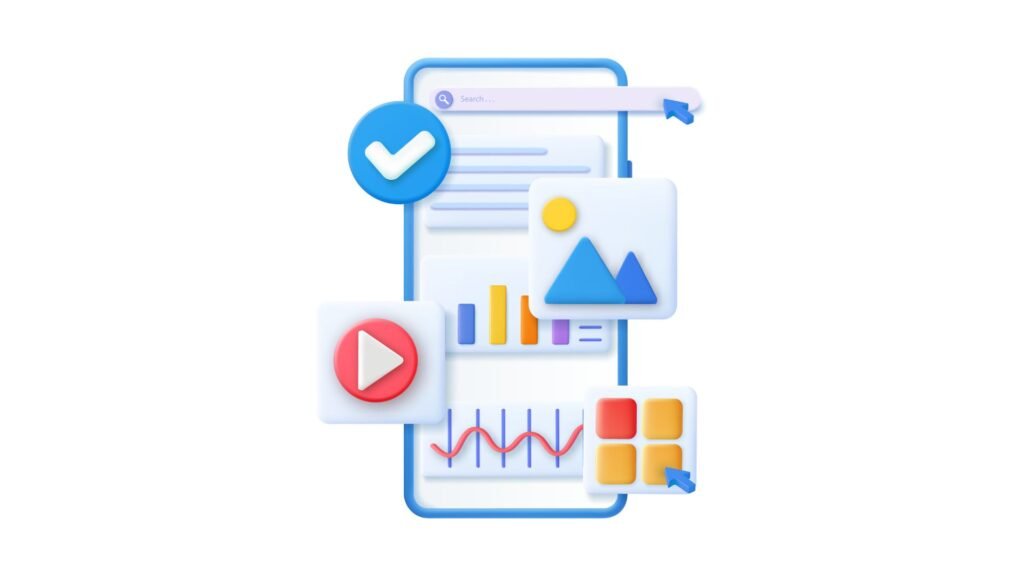
There are a lot of myths and misconceptions when it comes to how many backlinks i need to rank a website. In this blog post, we will dispel some myths and give you an honest answer to this question. We will also discuss other aspects of link building, such as backlinks, how they help your website rank and the different types of backlinks.
Google has made many changes to its algorithm in recent years, but backlinks still play a vital role in ranking your website. So don’t neglect this aspect of SEO!
How Many Backlinks Do I Need to Rank a Website?

Generally speaking, a healthy and diverse backlink profile will benefit your website more than just a high number of links. This answer can be challenging to give a specific number, as it depends on many factors. We will be discussing some of these factors in the next section.
So, let’s get started,
What Are Backlinks?
Simply put, a backlink is when another website links to your website. These links act as “votes” for your website, telling search engines that your website is credible and relevant. They also drive traffic to your website, as users may click on the link and visit your site.
Types Of Backlinks
There are two types of backlinks,
- Dofollow links
- Nofollow links
Most websites have a mix of both dofollow and nofollow links. Dofollow links pass along link juice, or ranking power, while nofollow links do not. It’s important to note that not all backlinks are created equal – the quality of the website linking to you matters most. A high-quality, relevant website linking to your own is more valuable than a low-quality website with no relevance.
Are Backlinks Still Important?
Despite recent changes to Google’s algorithm, backlinks are still a crucial part of SEO and can significantly impact your website’s ranking. While the quantity of backlinks is essential, the quality and relevance truly matter. Building quality backlinks take time and effort, but it’s worth it for the benefits it can bring to your website’s ranking.
6 Things That Matter In Ranking
While backlinks are important, they are not the only factor that impacts your website’s ranking. Here are six other factors to consider:
Domain Authority

This factor determines how well your website is established and how likely it is to rank high in search engines. Domain Authority can be improved by building high-quality backlinks, regularly updating content, and improving your website’s overall user experience.
Keyword Optimization
Using relevant keywords in your content, titles, and meta descriptions can help search engines understand what your website is about and how it should rank for those terms.
Mobile Optimization

More and more users are using mobile devices to search the internet, so your website must be optimized for mobile. This includes having a responsive design, fast loading speed, and easy navigation on smaller screens. (Accelerated mobile pages) AMP is a Google-backed project that helps websites load quickly on mobile devices. Implementing AMP can improve your website’s mobile search ranking.
Content Relevancy
Google used to consider websites with low-quality content, but the trend has changed. To rank your website, google checks how relevant is website’s content with the searched keyword.
High-quality, relevant content on your website is crucial for ranking well in search engines. Regularly updating your website with fresh, valuable content can increase your chances of getting backlinks from other websites.
User Experience

Improving the overall user experience on your website can have a positive impact on your ranking. This includes factors like website design, navigation, and loading speed. Visitors want to quickly find the information they need and have a positive experience on your website, so make sure it’s user-friendly.
Technical SEO
This aspect of SEO deals with how easily search engines can crawl and index your website. Technical SEO includes using a sitemap, correctly formatting your URLs, and fixing broken links. These technical elements can improve your website’s chances of ranking well in search engines.
How Many Backlinks Do I Need – A Honest Answer
There’s no definite answer to how many backlinks you need to rank a website. It ultimately depends on the competitiveness of your industry and how well your website stacks up against the competition in terms of the above-ranking factors.
You need no set number of backlinks to rank a website. It’s not just about quantity but also the quality and relevance of those backlinks. Building a diverse, high-quality backlink profile takes time and effort, but your website’s search ranking can pay off.
It’s essential to focus on building high-quality backlinks rather than just getting a lot of links from any website.
Can I Rank Without Backlinks?
While backlinks are beneficial for improving your website’s ranking, it is possible to rank without them. Other factors like keyword optimization, content relevancy, and technical SEO can also play essential roles in your search ranking.
However, building high-quality backlinks should still be a priority, as they can significantly impact how well your website is.
How Do You Get Backlinks?
There are several ways to earn backlinks for your website. But, Here are five effective methods:
Guest Blogging

By writing valuable content for another website in your industry, you can earn a backlink to your site. This technique can be very effective as long as the website you guest blog for has a high domain authority.
Resource Page Link Building
Many websites have resource pages where that link to use outside sources. Research relevant resource pages in your industry and reach out to the website owner, asking them to consider adding a link.
Broken Link Building
Find broken links on websites in your industry and contact the owner, suggesting they replace them with a link to your relevant content.
Testimonials And Brand Mentions

Offer to provide a testimonial for a product or service and ask for a backlink in return. This can also work with brand mentions, where a website may mention your brand, and you can reach out to ask for them to include a link.
Infographics
Create an infographic and reach out to websites in your industry, asking them to include a backlink when they share it.
These are just a few ways to earn backlinks for your website. Remember, It’s always a good idea to focus on creating valuable and relevant content that others will want to link to naturally.
What Type of Backlinks Help You Rank Faster?
Backlinks are one of the most important factors in helping your website rank faster on search engines like Google. But not all backlinks are created equal. Here are the types of backlinks that help you rank faster:
1. Editorial Backlinks (Natural Links)
These are the best kind of backlinks. They come when another website organically links to your content because they find it valuable or worth sharing.
- Trusted by Google
- No need to ask for it
- Usually from high-authority sites
2. Guest Post Backlinks
When you write a blog post for another website, and they allow you to add a link back to your site, it is called a guest post backlink.
- Helps build authority
- Control over anchor text
- Great for niche relevance
3. Niche Edits (Contextual Link Insertions)
These are links inserted naturally into existing content on a relevant website. These links appear more organic and carry good SEO value.
- Faster indexing
- Already-ranked pages
- More natural than new guest posts
4. Backlinks from High-Authority Domains
Getting a link from websites with high authority (like Forbes, HubSpot, or Moz) tells Google your content is trustworthy.
- Boosts domain trust
- Passes strong link equity
- Helps rank faster even with fewer links
These links pass link juice, which helps in improving your website’s authority.
- Directly boosts rankings
- NoFollow links don’t pass authority (but can still bring traffic)
6. Relevant Backlinks
Backlinks from websites in the same industry or topic are much more powerful.
- Improves topical authority
- Google sees you as an expert in your niche
- Higher trust signal
7. Backlinks from Aged and Trusted Domains
Links from old domains that have a clean history and good backlink profile work very well for fast rankings.
- Trusted by search engines
- Strong backlink profiles
- Faster impact
8. Homepage Backlinks
A backlink from a website’s homepage often carries more SEO power than links from internal pages.
- High authority
- Seen as more valuable
- Often gets indexed faster
9. Backlinks with Optimized Anchor Text
Using relevant keywords in the anchor text can boost keyword rankings—but use this carefully to avoid over-optimization.
- Keyword relevance
- Too much exact match = penalty risk
10. Backlinks from Traffic-Generating Pages
Pages that already rank well and get traffic can send both link juice and referral traffic to your site.
- Dual benefit – SEO + traffic
- Builds topical relevance
If you want to rank faster, focus on building a mix of quality backlinks—especially contextual, relevant, and do-follow links from authority sites in your niche.
How to Track Your Backlink Progress
Tracking your backlink progress is super important if you want to know whether your link-building efforts are actually working. Here’s a simple and effective way to track your backlink progress step-by-step:
1. Use a Backlink Tracking Tool
Start by using any of the following trusted SEO tools:
- Ahrefs – Gives you live backlink data and new/lost links
- SE Ranking – Affordable and easy to use with backlink monitoring
- Semrush – Comprehensive backlink audit and tracking
- Ubersuggest – Good free option for basic tracking
- Google Search Console – Free tool to see some of your top links
➡ These tools show you:
- New backlinks
- Lost backlinks
- Anchor text
- Referring domains
- Domain authority
- Spam score
2. Track Domain Growth Over Time
Use your tool to check:
- Growth in referring domains
- Increase in total backlinks
- Diversity of anchor texts
- Authority of linking domains
➡ A healthy backlink profile = consistent growth + diverse anchor text + relevant domains
3. Monitor Keyword Movements
Backlinks help with rankings, so monitor:
- Keyword positions
- Organic traffic changes
- Pages gaining/loss in visibility
➡ If backlinks are effective, your target keywords should start ranking higher.
You can track this inside:
- SE Ranking
- Ahrefs Rank Tracker
- Google Search Console
4. Set Alerts for New or Lost Links
Tools like Ahrefs, SE Ranking, and Semrush allow email alerts when you:
- Gain a new backlink
- Lose an existing one
➡ This helps you stay on top of link building without checking daily.
5. Maintain a Backlink Log or Sheet
Create a simple Google Sheet with these columns:
- Date acquired
- Linking domain
- Page URL
- Anchor text
- Type (guest post, niche edit, etc.)
- Dofollow/Nofollow
- Status (Live/Broken)
➡ Helps in manual tracking, client reporting, and reviewing progress.
6. Check for Broken or Lost Links
Some links may go down or be removed. Use tools to:
- Identify broken links
- Contact site owners to reclaim or replace them
➡ This ensures you don’t lose your hard-earned link equity.
7. Analyze Competitor Backlinks
Compare your backlink progress with your top competitors:
- Who’s linking to them?
- Can you get similar or better links?
➡ Helps you find gaps and opportunities to catch up or outrank them.
Google’s Comment On Backlinks
In a recent Google Webmaster Central office-hours Hangout, John Mueller commented, “building more backlinks in a manipulative way… that’s something where I’d try to distance myself from that as much as possible.”
Google wants website owners to focus on creating high-quality content and building natural, genuine links. Avoid any tactics that could be considered manipulative or unethical in obtaining backlinks.
FAQs
Q. How Do I Get High-Quality Backlinks?
Some ways to build high-quality links include creating valuable content that other websites want to link to, guest blogging on reputable websites, and reaching out to websites to request a link.
Q. How Do I Track My Backlinks?
You can use tools like Google Search Console and Ahrefs to track your website’s backlinks.
Q. Can I Buy Backlinks?
It is against Google’s guidelines and can lead to penalties for your website. It’s best to focus on building natural, high-quality backlinks through creating valuable content and networking.
Final Thoughts
Now that you better understand how backlinks can impact your website’s search ranking, it’s essential to focus on building a diverse, high-quality backlink profile. This may take some time and effort, but the results can benefit your website’s search ranking in the long run.
If you have any questions related to this article, feel free to leave your question in the comment section. We will be happy to answer you.
Thanks for reading:)


